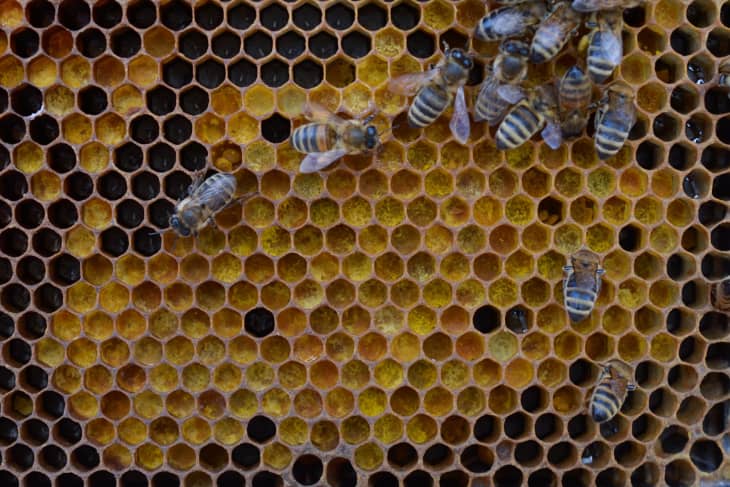What Is Bee Pollen (and Should You Care)?
Gwyneth Paltrow has promoted it as an “energy kick” on her lifestyle website, Goop; former Spice Girl Victoria Beckham counts it among the 60 supplements she takes daily; and “preppers,” people who stockpile supplies and hone their survival skills in preparation for the end-of-days, are hoarding the stuff, believing in its potency as a compact nutritional powerhouse.
If anecdotes are to be believed, we’ve got a magic bullet in bee pollen. Seasonal allergies? The perfect remedy. Suffering from the side effects of chemotherapy? Try pollen on for size. Looking to step up your athletic game? Get a boost from the bees. Low libido? This will get things buzzing again.
But is the hype real? What is bee pollen, and what can it do for you?
What Is Bee Pollen?
Bees collect pollen as they move from flower to flower, packing it down into pollen baskets on their hind legs until it forms tiny golden granules. Back in the hive, they store the pellets, feed them to their larvae, and feast on them themselves.
Why Are People Eating Bee Pollen?
Because bee pollen is rich in proteins, essential amino acids, and certain vitamins, it has been dubbed one of nature’s perfect foods — a reputation that is largely unfounded. A 1996 report in the Food and Agriculture Organization’s Agricultural Services Bulletin debunked the myth that bee pollen is a source of complete nourishment in and of itself: “That it is not a perfect food […] should be obvious. Its low content or absence of the fat-soluble vitamins should be sufficient scientific evidence.” That doesn’t mean that a little bit of it won’t benefit you, the study goes on to say, but take it with a grain of salt — you’ll need more than bee pollen to keep yourself up and running.
Perhaps bee pollen’s most common use is as a defense against seasonal allergies, taken in small doses to gradually build immunity to airborne pollens. Geo Johnston, director of operations at Maine Medicinals, recommends that his bee pollen be consumed a few granules at a time to “hedge your bets” — the same way you might get a flu shot to protect against the full-blown flu.
But while its efficacy in reducing seasonal allergy symptoms has been widely reported, so have several cases of pollen-related asphyxiation, particularly in people with bee allergies. That’s not something to be taken lightly. Indeed, Johnston urges caution for anyone trying out bee pollen for the first time. Swelling, tingling, or discomfort may be a sign of allergic reaction, and anyone experiencing these symptoms should discontinue use immediately.
Bee pollen has also been hailed as an antidote for countless other maladies, from lethargy to liver failure, but according to science, pollen isn’t the bee-all, end-all. A March 2016 review in the Journal of the Science of Food and Agriculture dropped a wet blanket on the myriad untested claims of enthusiasts: “The promising reports on the anti-oxidant, anti-inflammatory, anti-cariogenic[,] anti-bacterial, anti-fungicidal, hepatoprotective, anti-atherosclerotic, immune enhancing potential require long-term and large cohort clinical studies.”
So, Should You Try Bee Pollen?
As with many so-called “super foods,” we think you should eat what tastes good — and the subtly floral flavor of been pollen is a nice addition to smoothies, or sprinkled over yogurt, oatmeal, or salad. But due to potential allergic reactions to bee pollen, it’s a good idea for first-timers to speak with a healthcare provider familiar with natural health remedies.
It’s also wise, says McKel Hill, the Registered Dietitian Nutritionist behind the popular blog Nutrition Stripped, to be mindful of your source. Because it’s nearly impossible to control what and where bees pollinate, pollens differ widely in their composition, efficacy, and nutritional properties — even within the same region or brand. Quality manufacturers can test for harmful heavy metals and pesticides, which you definitely don’t want to consume.
Most of all, keep your expectations in check. If you’re looking for a natural performance-enhancer or a way to resuscitate a flatlined libido, you may want to investigate a backup plan.
